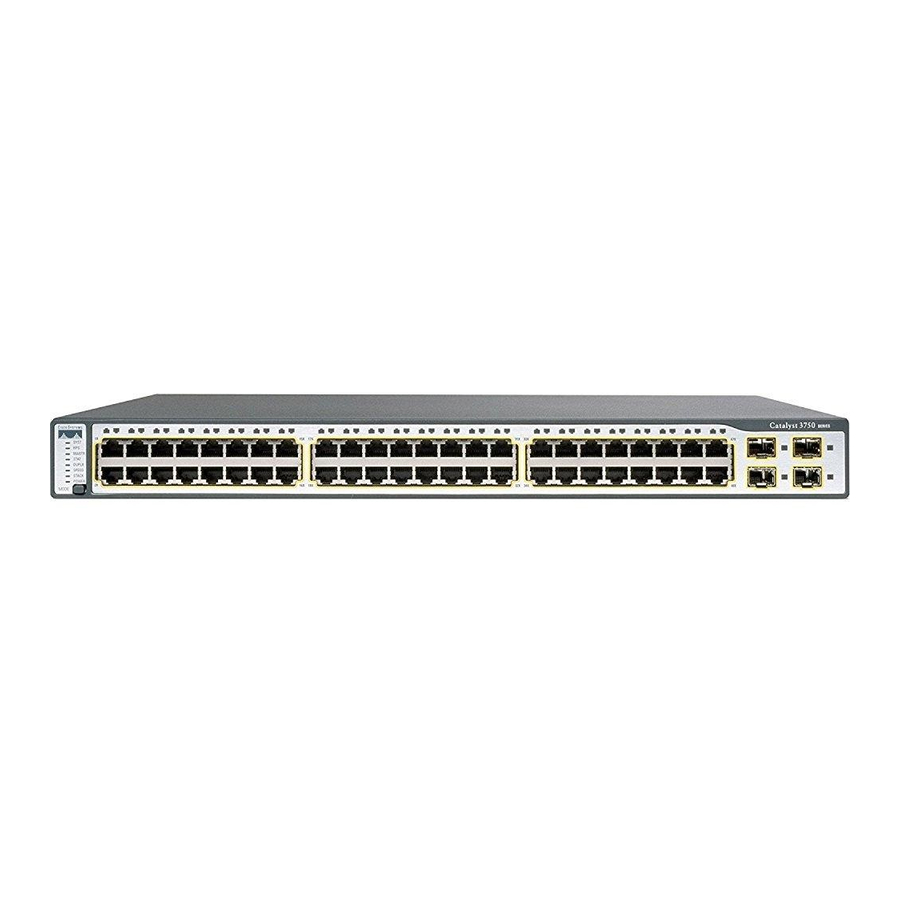All contents are Copyright © 1992–2006, 2008 Cisco Systems, Inc. All rights reserved. This document is Cisco Public Information.
Table 1.
Features and Benefits
Feature
Benefit
Ease of
● Autoconfiguration of new stack units eliminates reconfiguration.
Use and
● Dynamic Host Configuration Protocol (DHCP) autoconfiguration of multiple switches through a boot
Deployment
server eases switch deployment.
● Automatic Cisco IOS Software version checking and updating help ensure that all stack members
have the same software version.
● Automatic QoS (AutoQoS) simplifies QoS configuration in voice over IP (VoIP) networks by issuing
interface and global switch commands to detect Cisco IP phones, classify traffic, and help enable
egress queue configuration.
● Master configuration management helps ensure that all switches are automatically upgraded when the
master switch receives a new software version.
● Autosensing on each non-SFP port detects the speed of the attached device and automatically
configures the port for 10-, 100-, or 1000-Mbps operation, easing switch deployment in mixed 10, 100,
and 1000BASE-T environments.
● Autonegotiating on all ports automatically selects half- or full-duplex transmission mode to optimize
bandwidth.
● Dynamic Trunking Protocol (DTP) facilitates dynamic trunk configuration across all switch ports.
● Port Aggregation Protocol (PAgP) automates the creation of Cisco Fast EtherChannel
Gigabit EtherChannel groups to link to another switch, router, or server.
● Link Aggregation Control Protocol (LACP) allows the creation of Ethernet channeling with devices that
conform to IEEE 802.3ad. This feature is similar to Cisco EtherChannel technology and PAgP.
● DHCP Relay allows a DHCP relay agent to broadcast DHCP requests to the network DHCP server.
● IEEE 802.3z-compliant 1000BASE-SX, 1000BASE-LX/LH, 1000BASE-ZX, 1000BASE-T, and CWDM
physical-interface support through a field-replaceable SFP module provides unprecedented flexibility in
switch deployment.
● There is a default configuration to help ensure that the switch can be quickly connected to the network
and can pass traffic with minimal user intervention. This default configuration exists even if there is no
configuration stored in Flash memory.
● Automatic media-dependent interface crossover (MDIX) automatically adjusts transmit and receive
pairs if an incorrect cable type (crossover or straight-through) is installed.
Availability and Scalability
● 1:N master redundancy allows each stack member to serve as a master, providing the highest
Superior
Redundancy
reliability for forwarding.
for Fault
● Cisco CrossStack UplinkFast (CSUF) technology provides increased redundancy and network
Backup
resiliency through fast spanning-tree convergence (less than 2 seconds) across a switch stack with
Cisco StackWise technology.
● Cross-Stack EtherChannel provides the ability to configure Cisco EtherChannel technology across
different members of the stack for high resiliency.
● IEEE 802.1w Rapid Spanning Tree Protocol (RSTP) provides rapid spanning-tree convergence
independent of spanning-tree timers and also offers the benefit of distributed processing.
● Stacked units behave as a single spanning-tree node.
● Per-VLAN Rapid Spanning Tree (PVRST+) allows rapid spanning-tree reconvergence on a per-VLAN
spanning-tree basis, without requiring the implementation of spanning-tree instances.
● Cisco Hot Standby Router Protocol (HSRP) is supported to create redundant, failsafe routing
topologies.
● Unidirectional Link Detection Protocol (UDLD) and Aggressive UDLD allow unidirectional links caused
by incorrect fiber-optic wiring or port faults to be detected and disabled on fiber-optic interfaces.
● Switch-port autorecovery (errdisable) automatically attempts to reactivate a link that is disabled
because of a network error.
● Cisco RPS 2300 and RPS 675 Redundant Power Systems support provides superior power-source
redundancy for up to 6 Cisco networking devices, resulting in improved fault tolerance and network
uptime.
● Equal-cost routing for load balancing and redundancy.
● Bandwidth aggregation up to 16 Gbps through 10 Gigabit EtherChannel technology, 8 Gbps through
Gigabit EtherChannel technology, and up to 800 Mbps through Fast EtherChannel technology
enhances fault tolerance and offers higher-speed aggregated bandwidth between switches and to
routers and individual servers.
● Uplink bandwidth can be easily upgraded by adding a 10 Gigabit Ethernet version to a wiring-closet
stack and replacing the Gigabit Ethernet uplinks with 10 Gigabit Ethernet without having to change
fiber pairs.
Data Sheet
®
groups or
Page 6 of 23

